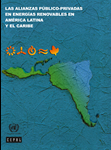A report from the UN Economic Commission for Latin America and the Caribbean (ECLAC) suggests that public-private partnerships (PPPs) can be key in mobilizing investment in non-conventional renewable energy in Latin America if access to financing and transparent, consistent legal frameworks are in place.
 May 2012: A recent report from the UN Economic Commission for Latin America and the Caribbean (ECLAC) highlights the importance of private participation to increase the use of medium- to large-sized non-conventional renewable energy projects, usually connected to national distribution networks.
May 2012: A recent report from the UN Economic Commission for Latin America and the Caribbean (ECLAC) highlights the importance of private participation to increase the use of medium- to large-sized non-conventional renewable energy projects, usually connected to national distribution networks.
The report finds public-private partnerships (PPPs) promoting unconventional renewable energy have already attracted US$9 billion in investment, and suggests keys to attracting more. As used in the ECLAC report, the term “non-conventional” renewable energy sources includes solar, wind, geothermal, biofuels and small (under 30 megawatts) hydropower, and excludes larger hydropower widely used in the region.
The first half of the report explains the current national electricity market in Argentina, Brazil, Chile, Colombia, Mexico, Peru and Uruguay, their segmentation by energy type and the roles and responsibilities of main actors in their electricity sectors, both public and private. It also briefly discusses environmental and social issues relevant to electricity, particularly climate change and access to modern electricity services, highlighting the key role that renewable energy sources can play in addressing these challenges.
The second half examines case studies of programs underway in the region to promote non-conventional renewable energies, and discusses best practices for the development of PPPs in the field. The report suggests two crucial elements to attract private investment (local or international) to non-conventional renewable energy projects in Latin America: access to financing of projects and associated infrastructure, and assuring the commitment and credibility of participating public institutions via transparent and consistent legal frameworks. [ECLAC summary (Spanish)] [Publication: Public-Private Partnerships in Renewable Energy in Latin America and the Caribbean (Spanish)]